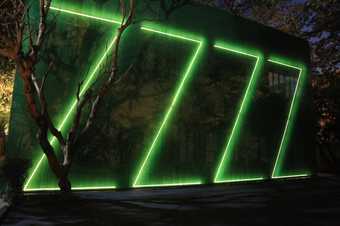Programme
Permanent Installation, South Terrace: Fujiko Nakaya, London Fog with Ryuichi Sakamoto and Shiro Takatani
Until 19.00 Tanks Foyer and East Tank: Isabel Lewis Occasion
19.10 East Tank: CAMP Four-Letter Film
19.30 South Tank: CAMP Camera Obscura
The fourth night of the BMW Tate Live Exhibition is dedicated to a screening and talk hosted by Shaina Anand and Ashok Sukumaran, co-founders of the critically acclaimed collaborative studio CAMP.
Using a live presentational format honed through years of public presentations in their rooftop cinema in Mumbai, CAMP takes us into the dark rooms and black boxes of our times. Camera Obscura is an assemblage drawn from the history of proto-photographic and photographic surveillance – from the eponymous darkened room which people entered to see an image of the outside world, to CCTV control rooms and hidden cameras the size of a spectacle screw – as well as from their own cinematic works and those of fellow artists. Together, they unsettle the neutrality of the documentary image and provoke us with ways of seeing, being seen and being heard.
Presented in parallel with CAMP’s Could Have Beens installation in the Transformer Galleries and East Tank, this live presentation provides fascinating insight into the group’s politically-engaged working methods. Could Have Beens will be on view throughout the evening alongside the work of Fred Moten & Wu Tsang, Isabel Lewis and Fujiko Nakaya, Ryuichi Sakamoto and Shiro Takatani.
About the artists
CAMP was founded in Mumbai in 2007 by artist and filmmaker Shaina Anand, software programmer Sanjay Bhangar, and architect and artist Ashok Sukumaran. The studio’s collective output is characterised by its engagement with technology and spans video, film, electronic media, and public art forms. From their base in Chuim village, the studio co-hosts the online Public Access Digital Media Archive of video footage and unfinished films (Pad.ma), and Indiancine.ma, an annotated online archive of Indian film. Through its long-term, durational projects, CAMP aims to reconfigure distribution platforms such as cinemas, libraries, exhibitions, books, and websites as a way to question the politics of authority and ownership.

